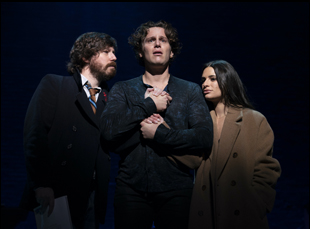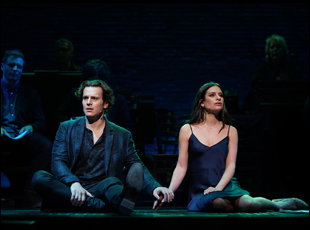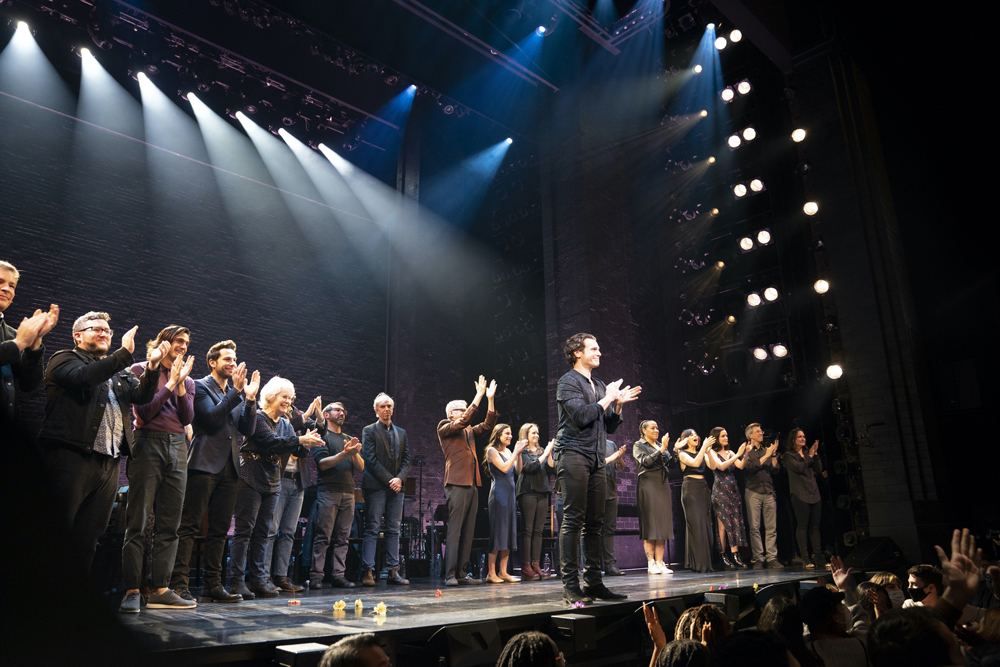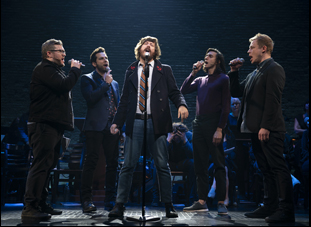There was even more pressure than usual on Michael John Warren when he was asked to capture a restaging of “Spring Awakening” with its original Broadway cast 15 years after they last were on the same stage together. A reunion only made possible when COVID freed up the typically busy schedules of its stars Lea Michele, Jonathan Groff and John Gallagher Jr., among others, and the Eugene O’Neill Theater for a benefit performance for the Actors Fund, the pandemic production would entail a number of safety protocols on top of all the typical rigors of making sure all the energy of a live performance pushes past the imposition of a screen and with little time to prepare, it was bound to be an experience even more intense than committing shows such as “Rent” and “Oh Hello” to film, but that isn’t what reduced him to tears.
“Of course there were a lot of tears, but tears aren’t bad necessarily,” laughs Warren, on the show that notoriously doesn’t leave a dry eye in the house. “There’s a lot of good tears…and some of the tears that were cried during the making of this are those kind, the tears that need to be had and shared. Hopefully, I did a good job of respecting the emotions that were offered up during this and [that] the audience feels some of the deeper elements of this film.”
It doesn’t seem like a day has passed when Michele, Groff and Gallagher Jr. begin to belt out numbers from the musical with a book by Steven Sater and music and lyrics from Duncan Sheik, taking inspiration from Frank Wedekind’s 1891 play of the same name yet creating a distinctly contemporary narrative out of repressed sexuality and teenage angst. Conceived in the wake of the Columbine massacre, the “Spring Awakening” reunion becomes a ray of light during another dark time as the cast and crew reassembles in the fall of 2021. At once falling back into the intimacies of once performing eight shows a week together and now able to look at their formative years at a distance, the key creatives give a behind the scenes peek at the show’s creation that illustrates how intertwined the growing pains on stage and off were.
With fan letters pouring in about how the show saved lives of those who felt alone in their struggles, “Spring Awakening: Those You’ve Known” features candid interviews with the cast about how the show helped them learn more about themselves, whether it’s Groff, who came to accept the fact he was gay after growing up near the Amish community in Pennsylvania, or Michele, who fell in love with him only to realize it wasn’t meant to be, and the soaring anthems such as “Don’t Do Sadness” and “The Bitch of Living” take on new resonance after learning all they went through. With personal photos and home videos from backstage and even a retreat to Groff’s family farm with the entire cast, the film ends up being a celebration of youth and its endless possibilities as the show it’s centered on, yet in cross-cutting between the past and present, Warren finds that there still are no limits to the show’s reach or what those involved are capable of. On the eve of the film’s debut on HBO this week, Warren spoke about the privilege of sitting in on such an emotional performance, bringing together so many juicy storylines and creating history in such a condensed period of time.
I got a call from Radical Media, who I’ve done a number of things over the past two decades with, and Dave Sirulnick, who I’ve known for a long time said, “We’ve got this movie…” and I had a lot of things cooking at that moment, [so I thought] whatever he’s talking about, I can’t say “yes.” He told me it was “Spring Awakening” and I was like, “Well, I know that’s one of the more special shows in the history of Broadway.” Then he told me, “It only films in five days,” meaning we only had five days to shoot the whole movie,” and I’m like, “That sounds crazy, but it actually makes it fit in my calendar a little better.” And then he told me it was going to be for HBO and I was like, “There’s no way I can say no to this.” HBO is the absolute pinnacle of quality programming for a long time now, so I thought I couldn’t do it, but then I just couldn’t say no because how do you say no to that offer?
It isn’t only you that has five days to make this film, but when it’s that condensed for all involved, including this cast and crew that hasn’t been together all in one place in 15 years, was it pretty intense emotionally?
This was a very emotional production, both behind and in front of the camera. Even with the finished film, I still cry when I watch the third act of this film and I cried when Lea sang “Mama Who Bore Me” in the rehearsal room that day. [laughs] And I think it’s part of my job as an artist to open my heart and let things wash over me, but then of course I’m also a director and an executive producer and I have to be open and let it hit me right in the heart and also let me know what the next step is and remain calm and functional and pragmatic all along the way. There was just so much goodwill throughout this production and everyone wanted this film to be special. The actors loved this show and they were dying to tell me these stories. They offered me up these gems and they also did it because they knew this film was going to be special.

Jonathan Groff is an executive producer on this movie and sometimes that can be a hollow vanity thing, but not with Jonathan Groff. This man moved mountains for this film and he was constantly working the cast for “Who has photos of this? Who has images of that?” organizing it and getting it to my film team, so he really led the charge. And how great is that farm footage? It comes at such an important part of the film because you’ve really been through the ringer emotionally [with the dramatic climax of the show] and suddenly, it’s like, “Hey, let’s go hang out at the farm.” You need that little break from the intense themes of this film. But that footage was never going to be seen ever unless Jonathan told me about it. His mother is the cameraperson in all of that footage, that’s her voice behind the camera and then got it to our film crew. There’s also that other amazing footage of [Jonathan and Lea’s] last night as Melchior and Wendla backstage and you can’t research and find that. You have to have someone like Jonathan Groff, who’s like “I think there’s footage of that somewhere” and he goes and gets it.
Something I’ve always wondered when you’re bringing in a film crew into a stage production, is it an interesting alchemy when those two mix, given the institutional knowlege the stage crew may have?
The first time that was ever done was in 2008, “Rent: Live on Broadway,” which I directed and Radical Media produced and I’ll tell you, it was not easy, frankly. There’s a lot of unions on Broadway and I’m a union guy, but I bring an army and they already have an army and that first time around, it wasn’t like, “Oh, we love the film crew.” Over the years, there’s a bit more understanding now. Obviously, Radical did the “Hamilton” film and it went onto huge success and we’ve done these other films that have been really well-received, thankfully, so everyone gets it now, but it’s never been easy.
This film because the concert was a fundraiser for the Actor’s Fund, there was so much goodwill and I’ve never had an easier time integrating with a Broadway production than I did on this. And thank you to all of those hardworking stagehands and wardrobe people and stage managers because they really let me in and this is during COVID, mind you. This is not just showing up with cameras. We’re showing up with cameras in New York City and if there’s an outbreak then, the show that we’re borrowing a stage from is going to have a huge problems, so thankfully everyone really played nicely and I hope that I’ve honored all that goodwill with the final product.

Yeah, the first thing I did was study every single line, every single lyric and every single thing that happened in the original production in 2006. I have a document that I don’t know how many pages [it was], but it’s a breakdown of how the whole thing fits together. I ignored calls for days because I literally got the call a week or two before we started filming. And I just stopped answering e-mails and calls because I was like I can’t do anything until I understand every single beat of this show. I did that, started doing the interviews and got all these incredible stories.
There’s four plots in this film – what happens on stage in the play, there’s the story of the original production in 2006, there’s the reunion and then there’s the love story between Jonathan and Lea. Most films have two plot lines and maybe a minor third, but this is four pretty rich plot lines and [the question was] how do you weave those together where it doesn’t crash into each other and and an audience is like, “I don’t understand what’s going on.” I had a small but incredible team — I had a one woman story department named Katie Dunn, who is brilliant and incredibly hard-working and my editor Josh Pearson, who won the Academy Award a couple months ago for editing “Summer of Soul” — and [we] mapped it all out and they’re like, “No, Michael, this should go here and that should go…” we really just had this board of all these cards and just constantly updated it. It was a really ambitious plan to edit this film. We only had weeks. We didn’t have months. And luckily, I had the people who are very experienced, very smart and very hard-working and hopefully it resonates for people.
As emotional as it must’ve been at the benefit concert, what was it like being at the premiere where all of these people are seeing their history reflected back to them?
It was really exciting. It’s always tough when you make documentaries because a lot of people in documentaries aren’t used to looking at themselves — even actors aren’t necessarily used to looking at their real selves, so it’s always a little nerve-racking. But these guys were so open and so ready to experience this, and the room that night was incredible. There were ovations throughout the film and people laughing and screaming for joy. There were lines that people didn’t hear during the premiere because the audience was still reacting to something that had just happened. Now granted that’s a room that’s really excited to see this movie, but I just hope that as this beams out to millions of people in the coming days that some of that joy and that fun occurs in households around the world. I hope it connects for people because this isn’t just about a reunion, but there’s really important messages within this film that are as relevant today as they were back in 2006 and all the way back to the original text [from] 1891 Germany, and I really hope that someone that needs to hear some of these messages that are contained within this film stumble across this movie.
“Spring Awakening: Those You’ve Known” premieres on HBO on May 3rd at 9 pm and will be available thereafter on HBO Max.





